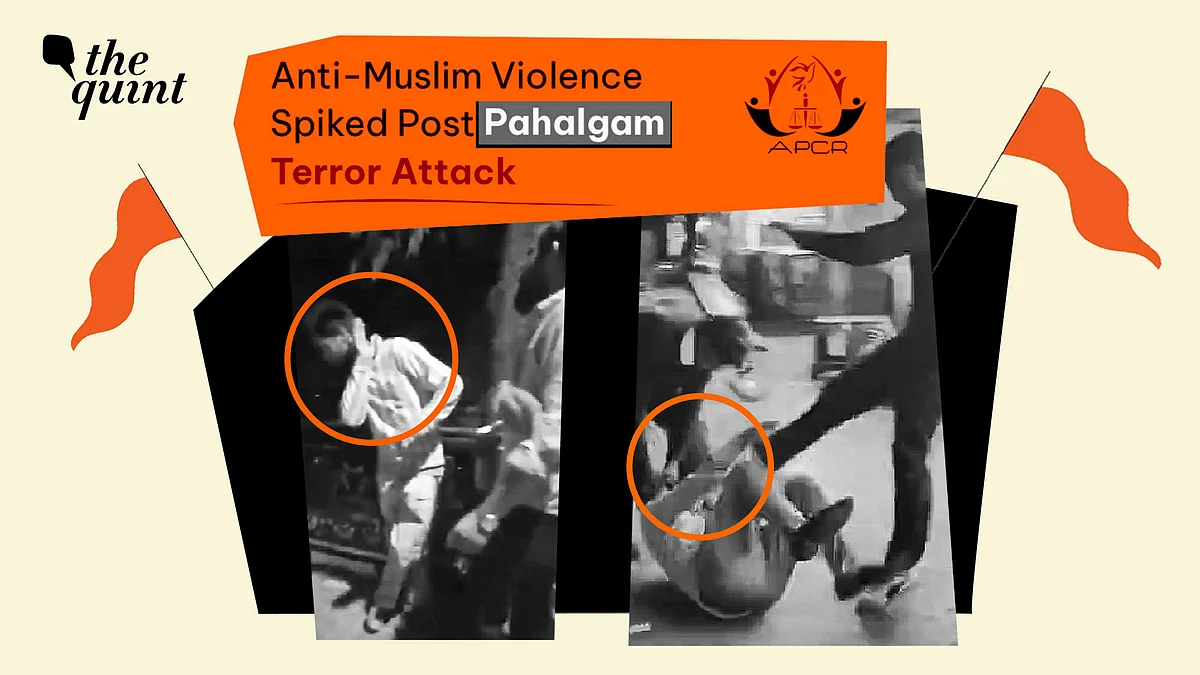184 Hate Incidents Took Place Across India Post-Pahalgam Attack: APCR Report
APCR's report claims that 184 hate crimes took place post-Pahalgam attack, affecting 316 victims.

advertisement
(Reporting on communalism and hate crimes is a key focus area in The Quint's reportage. You can become part of this by supporting our Uncovering Hate project.)
From exposing misinformation to delivering impactful human rights reporting, our newsroom has relentlessly pursued stories that drive change. We remain committed to asking the tough questions — and we'd love for you to be a part of our journey. By financially empowering us, you ensure that our stories reach a wider audience and help keep independent journalism alive.
Become a Quint Member today — CLICK HERE , choose a plan, and make your payment.
An alarming rise in anti-Muslim hate incidents took place in the aftermath of the Pahalgam terror attack, reveals a report by the Association for Protection of Civil Rights (APCR). The report, covering the period from 22 April to 8 May 2025, documents 184 hate incidents across India, including 106 wherein the Pahalgam attack allegedly acted as a triggering factor.
The violence, APCR states, followed clear patterns, which were neither random nor isolated, pointing to a broader atmosphere of growing hostility.
Read all The Quint stories on Pahalgam, Operation Sindoor and the hate crimes since the terror attack here.
Hate on the Rise: What Post-Pahalgam Data Reveals
Number of hate incidents in different states Post-Pahalgam
(Source: APCR report)
Categorisation of Hate incidents
(Source: The Quint through APCR report)
'Hate Crimes Don't Just Occour in Isolation': APCR
The Quint spoke to a member of the APCR team who pointed out that the Pahalgam attack wasn't just an isolated trigger for spontaneous acts of violence, but a part of a larger pattern of communal hostility.
“Often, when hate crimes happen, they don't happen in isolation. There is some context to it. There is some build-up to it,” Tazeen Junaid, APCR member, said.
Even in places where physical violence did not occour, references to Pahalgam were common. “There have been economic boycott calls for a while now, against Muslim traders. But in those incidents also, references to Pahalgam were very evident. Or, you know, like, calling Muslims terrorists became very evident,” Junaid told The Quint.
Suresh Chavhanke's post on X.
(Photo: X/Twitter)
APCR report also lists out all the 184 incidents. Here are some of them below.
Details of the hate incidents as compiled by the APCR Report.
(Source: APCR Report)
APCR's report also corroborates several instances that were reported by The Quint, such as the assault on two shawl sellers from Jammu and Kashmir on 23 April 2025.
As the video purportedly shows, some locals approached two Kashmiri shawl and suit sellers, harassed, slapped and abused them. "Are you not able to understand?" they asked them while ordering them to leave.
Another such incident includes the Hindu Raksha Dal's call to "drive out" Kashmiris from Uttarakhand.
In this report by The Quint on post-Pahalgam hate crimes, multiple instances of targeted hate against Muslims have come to light, involving threats both offline and online.
In another incident of hate speech on 4 May in Ghaziabad, Uttar Pradesh, during a bhandara, Hindu Raksha Dal leader Bhupender Chaudhury, while referring to Muslims as “Mullas,” ordered workers to deny them any food and claimed that Muslims should be expelled from India.
In offline acts of hate speech, an incident was reported in Maheshtala, West Bengal, where a pregnant Muslim woman was allegedly denied medical treatment and subjected to hate speech by a local gynaecologist following the Pahalgam terror attack.
Another hate crime as was reported by The Quint took place in Tajpur, Agra, on 23 April, a day after the attack, when Mohammad Ghulfam was shot dead outside his family-run biryani restaurant. His cousin Saif Ali, however, sustained a bullet injury.
In the viral video, the self-proclaimed 'gau-rakshaks' were seen threatening "to kill 2,600 Muslims as revenge for the 26 tourists killed in Pahalgam."
The police posted a video statement by Saif Ali (eye-witness to the scene), saying that his name or religion were not asked. But in the vigilantes' video, they seem to be admitting to the nature of the crime. An FIR was filed under BNS sections for murder and attempt to murder.
As for whether there has been any reduction in hate crimes since Operation Sindoor was launched, Junaid said it was too early to draw conclusions. “The spike has now gone down. But I would again reserve my opinion." There might be a dip, but whether that's a real decline or delayed reporting, it is hard to say.